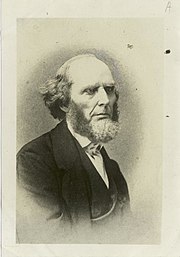Charles Grandison Finney
Charles Grandison Finney (born August 23, 1792 in Warren , Connecticut , † August 16, 1875 in Oberlin , Ohio ) was an American revival preacher .
Life
Charles G. Finney was the youngest of seven children in a simple farming family . In 1818 he began training as a clerk in a law firm in Adams, New York State . Through his studies in jurisprudence field, he always came in contact with quotations from the Bible ; to see the scriptures in their context , he began to read the entire text more and more often.
In the fall of 1824 Charles Finney had a conversion experience when he was walking alone in a grove. A few days later he had another intense experience with God, which he later described as being baptized in the Spirit .
After this dramatic experience, Finney became a full-time minister and later also an ordained pastor in the Presbyterian Church . In several locations, Finney saw congregations awakened by his preaching . It is estimated that up to 500,000 people were converted through his style of preaching . Historiography speaks of the “ Second Great Awakening, ” which connects with his own and that of other preachers.
In 1835 Finney was called to the Oberlin Collegiate Institute ( Oberlin College ), a theological faculty founded in Oberlin, Ohio in 1833 , where he trained preachers. From 1851 to 1866 he was the principal of Oberlin College. He lectured to his students until shortly before his death.
During a trip to England in 1859-61, Finney brought his new method of mass evangelization to Europe and had a great influence on the fact that the sanctification movement, shaped by the "Oberlin theology", spread here as well. Their influences also determined the German community movement in the last third of the 19th century.
“It is one of the greatest and most deplorable grievances nowadays. Even with genuinely devout pastors, Christianity is in many cases so superficial that they cannot understand the genuinely spiritually minded members of their communities. Their sermons do not meet their needs and therefore do not feed them properly. They do not agree with the experiences they have had. The clergy in question are not deep enough to investigate the damage to the souls entrusted to them and to be able to awaken the community. "
Finney was married three times. He had six children with his first wife, Lydia Root Andrews (1804–1847). One son was the railroad engineer and manager Frederick Norton Finney . He donated the Finney Chapel at Oberlin College in his honor. In 1848 he married Elizabeth Ford Atkinson (1799–1863) and in 1865 Rebecca Allen Rayl (1824–1907).
Fonts (selection)
- Help in prayer. Principles of prayer . Dynamis, Kreuzlingen 1983. ISBN 3-85645-039-4
- Revival - God's promise and our responsibility Bernard, Siegen 1987. ISBN 3-925968-03-2
- Life memories. Düsseldorf 1902 (Reprint: Bernard, Solingen 2001, ISBN 3-925968-99-7 )
Secondary literature
- Ulrich Gäbler : Reason, Morality, Conversion . Charles Grandison Finney's Revival Sermon in North America 1824–1832 , 1980. ISBN 90-242-0186-1
- Ulrich Gäbler: "Resurrection Time". 19th century revival preacher. Six portraits. CH Beck Verlag, Munich, 1991. ISBN 3-406-35157-3
- Friedrich Wilhelm Bautz : Finney, Charles Grandison. In: Biographisch-Bibliographisches Kirchenlexikon (BBKL). Volume 2, Bautz, Hamm 1990, ISBN 3-88309-032-8 , Sp. 33-34.
- Charles E. Hambrick-Stowe: Charles G. Finney and the Spirit of American Evangelicalism. Eerdmans, Grand Rapids 1996.
See also
Individual evidence
- ^ A b Randall Herbert Balmer: Finney, Charles Grandison . (1792-1875). In: Encyclopedia of Evangelicalism . Baylor University Press, Waco 2004, ISBN 1-932792-04-X , pp. 262 (English).
- ^ Charles G. Finney: Revival. God's promise and our responsibility. 2nd Edition. Bernard, Solingen 1998, ISBN 3-925968-03-2 , p. 121.
Web links
- Literature by and about Charles Grandison Finney in the catalog of the German National Library
- Collection of Quotes from Finney on the Voice of Faith website
| personal data | |
|---|---|
| SURNAME | Finney, Charles Grandison |
| BRIEF DESCRIPTION | American revival preacher |
| DATE OF BIRTH | August 23, 1792 |
| PLACE OF BIRTH | Warren , Connecticut |
| DATE OF DEATH | August 16, 1875 |
| Place of death | Oberlin , Ohio |
